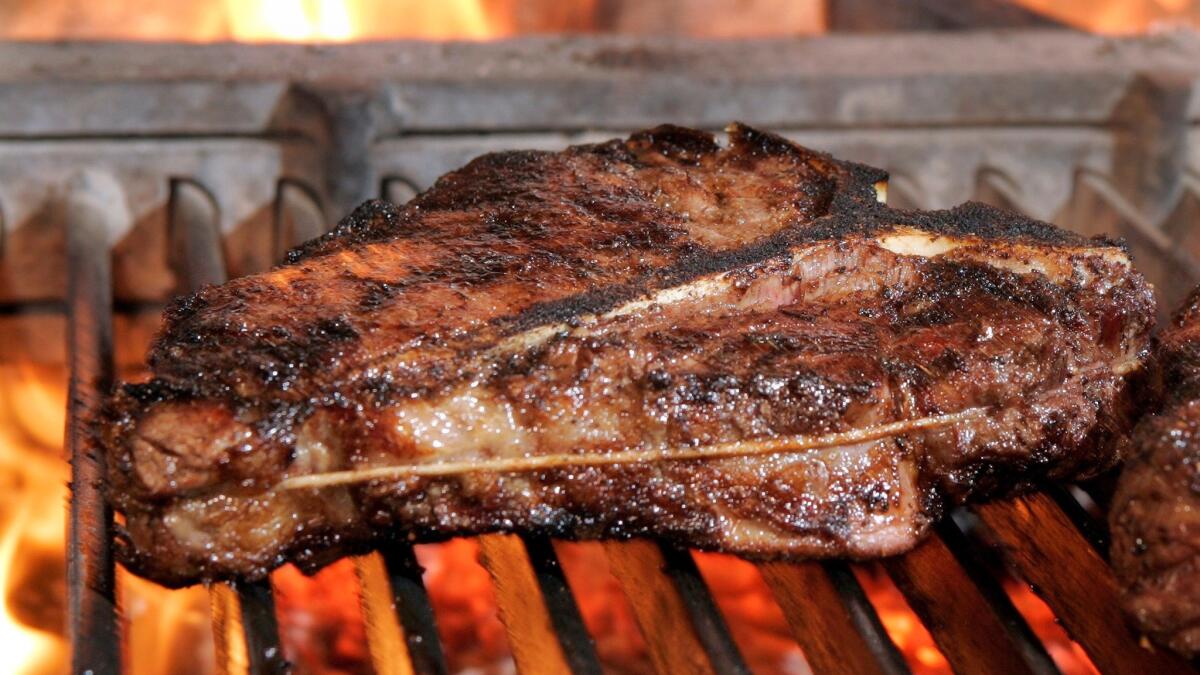The truth about marinades: Most are a waste of your time

Good meat, salt, pepper and a live fire is what makes a great steak.
- Share via
Marinating meats for the grill seems to bring out the inner herbalist in even the most hard-boiled of home cooks. A little olive oil, some lemon juice, a handful of herbs, some exotic spices -- whatever smells right. It’s almost like we’re designing a scented bath oil rather than a seasoning for meat.
The truth is, though, that marinades rarely do much good.
Most really don’t have much of an effect. In fact, in some cases -- those that call for a long soak -- they actually can do more damage than good.
Though composing complicated marinades may be satisfying on a certain intuitive level, with few exceptions, the mixture won’t do much more than coat the surface of the meat. It won’t tenderize it, and it will only impart the more forceful flavors.
RECIPES: 6 great ways to grill fruits and vegetables
No matter how long you soak it, most marinades won’t penetrate more than the outside eighth of an inch. That’s because meat is made up mostly of water (about 75% by weight) and water and oily marinades don’t mix. This is true whether you’re marinating for a half-day or for a week.
In most cases, that isn’t actually a bad thing. Most meats we marinate are thin cuts -- chicken pieces or beef or pork steaks. With these thinner cuts you’re almost always guaranteed to get a good bit of seasoned surface meat when you take a bite.
But in some cases, marinating can actually damage the meat. If you have very much acidity in the marinade -- vinegar or lemon juice, for example -- too long a bath can make the meat mealy.
This is based on the same science that leads some to believe that marinating “tenderizes.” Acid does denature protein -- it unwinds the tightly balled strands -- and that does make meat softer.
But remember that marinades rarely penetrate beyond the surface. So what is actually happening is that the outside of the meat is becoming overly tender -- mealy -- while the inside remains mostly untouched.
If you want to make a tough cut of meat more tender, it’s better to simply slice it thin, either before or after grilling.
And as for those complicated flavor combinations, subtlety tends to go out the window when it’s asked to compete with the primal flavors of meat and char.
Surprisingly, simply generously seasoning with salt and freshly ground black pepper will work wonders for flavor. This is particularly true if you do this 30 to 45 minutes in advance.
Try this sometime: Cook three steaks, one that has been salted and peppered in advance, one that has been seasoned just before grilling and a third that is seasoned only afterward. The difference is astonishing. Steak seasoned at the end tastes like meat with salt. Steak seasoned just before grilling is a bit better. But steak seasoned early has a deep, complex flavor and a much richer brown crust.
If you do want to get more complex with marinades, remember that it’s going to take some big flavors to stand up to the taste of seared meat -- use garlic, shallots and other members of the onion family and dried peppers and other spices.
Acidity should be considered more a flavoring than a tenderizer -- and it’s an important one. Because most of the meats we grill are fairly fatty (that’s what makes them good for the grill), adding vinegar or citrus juice is a good balance.
The notable exception to the rule that marinades only work skin-deep is brining. That’s because salty water can more easily penetrate the meat than an oil-based marinade.
And brining does more than just give flavor. It actually makes the meat seem juicier by increasing protein’s ability to retain moisture.
Dry-brining -- liberally salting the meat and letting it stand for several hours or even days -- does much the same thing. What happens in this case is that the salt pulls moisture from the surface, dissolves in that liquid and then is absorbed deep into the meat.
This can take as little as a couple of hours for a thin fish fillet, a half-day for thin steaks or three or four days for a whole turkey.
Simply salting meat and letting it stand may not have the romance of more complicated marinades, but it works.
Are you a food geek? Follow me on Twitter @russ_parsons1
ALSO:
Why grilled meat tastes so good
Buy This Now: Figs, with 12 recipes
More to Read
Eat your way across L.A.
Get our weekly Tasting Notes newsletter for reviews, news and more.
You may occasionally receive promotional content from the Los Angeles Times.











